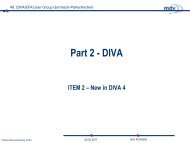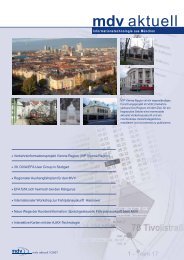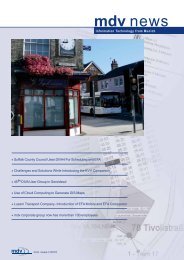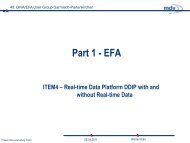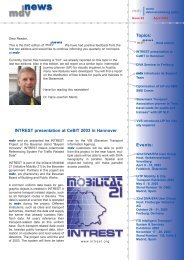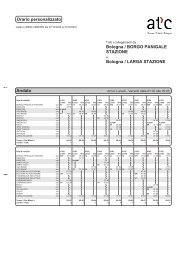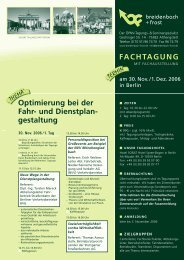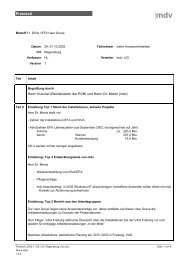II/2004 - Mentz Datenverarbeitung GmbH
II/2004 - Mentz Datenverarbeitung GmbH
II/2004 - Mentz Datenverarbeitung GmbH
Create successful ePaper yourself
Turn your PDF publications into a flip-book with our unique Google optimized e-Paper software.
Day Specific Planning with DIVA<br />
Day specific planning is used very differently<br />
by the individual transport operators.<br />
Some DIVA users cannot offer services<br />
according to the scheduled timetable<br />
on 80% of all operating days due to<br />
road works, exhibitions, etc. Naturally,<br />
these changes in the timetable must be<br />
planned and communicated to the passenger.<br />
Actually, day specific planning is nothing<br />
special. Through the definition of a service<br />
calendar, each calendar day is allocated<br />
to a day type. However, this can<br />
get very complicated for the user.<br />
Additionally, a large portion of the data<br />
must be redundantly entered and saved.<br />
The amount of data to be entered<br />
increases greatly with an increase in the<br />
number of routes. If, for example, on<br />
one day a route serves another route<br />
option due to road works, a new day<br />
type must be created for this calendar<br />
day. The planning during road works is<br />
carried out in the new day type. The problem<br />
with this: many other lines must be<br />
copied into the new day type. You can<br />
imagine what happens if two lines have<br />
separate road works deviations that<br />
timely overlap.<br />
The planning of a route group<br />
should be possible without influencing<br />
other route groups. In a<br />
route group, all routes that<br />
change are pooled. Within a<br />
route group, all blocks are consistent.<br />
For the first time, this is solved in<br />
DIVA through the introduction of a<br />
calendar per route group. In this<br />
calendar only special occasions<br />
concerning the route group are<br />
defined. The calendar of one<br />
route group does not influence<br />
the calendar of the other route<br />
group.<br />
This solution sounds trivial but<br />
has serious consequences for<br />
the DIVA program and its users.<br />
How are calendars per route<br />
group to be exported to VDV<br />
compatible systems such as AVL<br />
systems and passenger counting<br />
systems? Especially these interfaces<br />
are an important part of the<br />
DIVA system and were, amongst<br />
others, responsible for the success<br />
of DIVA in the last years.<br />
This is possible through the introduction<br />
of a network-wide valid<br />
service calendar that can be<br />
mdv news <strong>II</strong>/<strong>2004</strong> - 4 -<br />
used, for example, for the VDV export.<br />
The calendars that are defined for each<br />
individual route group must be mapped<br />
on this network-wide service calendar.<br />
And how should the duty schedule<br />
work? The duty schedule does not know<br />
any route groups. The calendar of the<br />
duty schedule must work for several<br />
route groups. Often a reduced or extended<br />
calendar is necessary for duty scheduling,<br />
for example because services<br />
are not planned in the timetable schedule<br />
but are only defined as secondary<br />
service in the duty schedule. Therefore,<br />
in DIVA the calendar of the duty schedule<br />
can be extended and modified, based<br />
on the service calendar of the timetable<br />
schedule.<br />
For the publication of timetable data for<br />
the passenger, day type specific data is<br />
mostly not of interest. If all details of day<br />
specific planning would be presented,<br />
for example in a stop timetable, the passenger<br />
would drown in footnotes. In order<br />
to keep the stop timetable readable, the<br />
data are normally smoothed out. Therefore,<br />
in DIVA it is also possible to define<br />
a special calendar for publication purposes.<br />
Day specific planning can basically be<br />
performed following three different strategies:<br />
1. The service calendar is identical with<br />
the calendars of the route groups.<br />
This is a wise strategy for smaller<br />
operators with few routes.<br />
2. A calendar is defined per route group.<br />
The service calendar is defined in<br />
such way that on the one hand all<br />
route groups can be scheduled exactly<br />
and on the other hand as few day<br />
types as possible are created in the<br />
service calendar. This strategy is useful<br />
if a restriction on the number of<br />
day types in the consuming systems<br />
(AVL, passenger counting, etc) exists<br />
which excludes the third strategy.<br />
This is the case for most operators.<br />
3. Parallel to the second strategy, a<br />
calendar per route group is defined.<br />
The network-wide valid service calendar<br />
is defined on a 365 day types per<br />
year basis. This is a sensible strategy<br />
when more than one operator is planned<br />
in a timetable schedule. This<br />
strategy implies that the consuming<br />
DIVA Graphic Schedule enables the handling of overall day types in the new days of operation concept. The program sh



